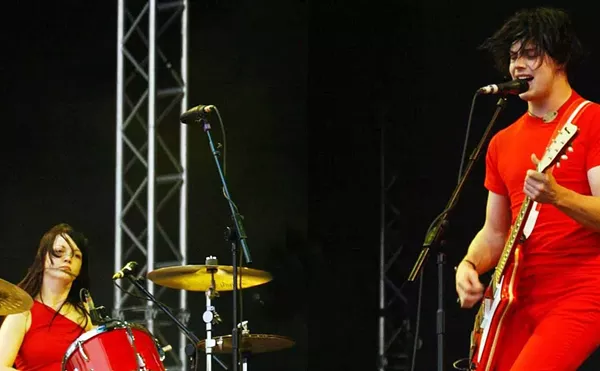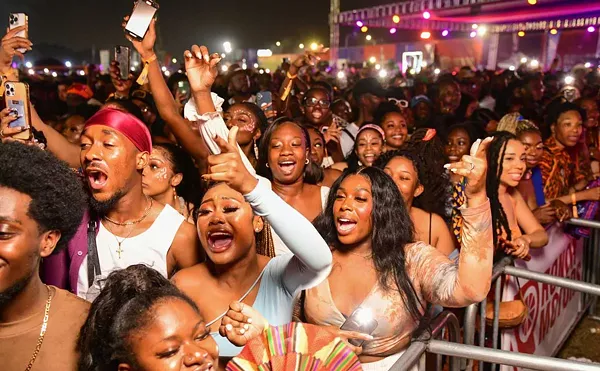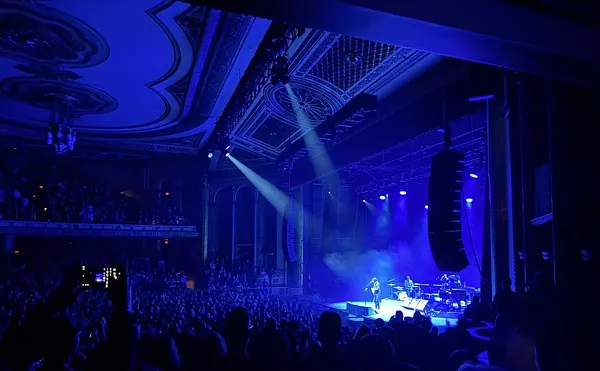
Audio By Carbonatix
[
{
"name": "GPT - Leaderboard - Inline - Content",
"component": "35519556",
"insertPoint": "5th",
"startingPoint": "3",
"requiredCountToDisplay": "3",
"maxInsertions": 100,
"adList": [
{
"adPreset": "LeaderboardInline"
}
]
}
]
He says this with a chuckle, knowing full well this land of subdivisions and strip malls is an unlikely place for Detroit’s next hip-hop crossover hopeful to come from, much less brag about. Sure, Kid Rock had his rural Romeo roots, and Eminem his blue-collar Warren-Eight Mile background. But Livonia?
"Kracker (Kid Rock’s DJ) always jokes around, ‘I don’t know if you should really admit that’s where you’re from,’" Paradime offers. "And I’m like, ‘Fuck it, there’s a lot of kids out there.’ You go to high schools around the suburbs of Detroit, all these tough kids with baggy pants are listening to Raekwon, Wu Tang Clan." He’d know; he’s one of them.
But it’s not just because Paradime shares the same suburban background with his audience that he’s Detroit hip hop’s most promising contender to break nationally. There are his skills, many of which don’t involve a microphone. Other rappers from Detroit are breaking nationally, most notably Champtown and Esham. But none are, for lack of a better term, as vertically integrated as Paradime. On the one hand, he has the underground credibility to record with Eminem’s all-star side project, D12. He’s held his own warming up for Wu Tang’s Raekwon and for audiences even less excited to see white kids on the mic when he opened up for Bahamadia and Jeru the Damaja, as he did in New York last winter. He’s even been recording raps for ghetto-tech producer Disco D, in and of itself a pretty forward-thinking move, since few Detroit rappers acknowledge, let alone embrace, Detroit’s wildly popular booty sound.
Then again, he talks lucidly about the need to have a real band to expand his audience, a lesson he and his DJ (and cousin), Mark EP, learned touring with Kid Rock in 1996. "The number one thing I’ve learned from Kid Rock is the importance of a stage show," he offers.
"When we went on that tour, we thought we were dope, but Kid Rock’s whole point was that we needed to do something different – that’s why I got a band now," he explains.
The rapper-with-band thing, he says, was a natural. His second band, in fact, came to one of his gigs as fans, and when his original band didn’t show, they stepped in. "They already knew all my songs from my CD!" he remembers.
Now on band version 3.0, he’s backed by Ann Arbor’s Platipus, an instrumental hip-hop group. Band? Stage show? Paradime is the first to point out that his take on the Detroit rap sound, known more for its orneriness than theatrics, is a proudly unconventional one, if only because of just what and where he’s representing.
"I’m not a flashy, big-chain rapper. My shit’s got more of a suburban feel to it," he admits. "But it’s still ghetto, it’s got that Detroit craziness to it. ‘Punch-you-in-the-mouth music,’ I call it. It’s got that Detroit backbone."
His self-released album, Paragraphs, is already a modest regional success. "I’m all sold out of ‘em right now, actually," he explains, then adds humbly, "But it’s not like people are getting sick of hearing it on the radio either."
At first listen, Paragraphs mines the same lager-breathed rowdiness of fellow-suburban favorites House of Pain, especially with its unkempt beats and loutish ode to Guinness on a track of the same name. But tracks like "Broke" (which ‘Dime begins, "this is not for the playas") and the brilliant "Same Ole Same Ole" (with its immortal summation of suburban nightlife: "We drive the same cars/some the same bikes/we go out on the same nights/with the same gear/wearing the same Nikes"), recall the everykid Midwestern frustration of Eminem.
"I’ve heard that from a few people, but not Eminem himself," Freddie admits with a laugh. So where does he see himself in Detroit’s honky rap pantheon? "Kid Rock’s on his crazy pimp thing, and Em’s on his fourth-dimensional rhyming sprees; I’m just more down to earth."
Asked why, he points to his relatively grounded background (he owns his own industrial cleaning business in Livonia) and his aversion to claiming any boy-in-the-hood cred.
"I listened to rap in the mid-’80s, when everybody else says they started to, but I was also always into skate-punk bands like TSOL. and Jodie Foster’s Army," he explains.
"I’m not a rap purist in the sense that everything’s just about skills and two turntables and a microphone and all that.
"I opened for Raekwon with just turntables, and it was cool. But then when I go play colleges with a full band, it feels a lot better, like you’re putting on a show, not just re-creating a record."
He agrees that hip hop has devolved from the original open-mindedness that inspired Afrika Bambaataa to put two Kraftwerk records together and put on a space suit to give the world "Planet Rock," and looks beyond hip hop’s painted-itself-into-a-corner materialism and sameness to FM radio for his inspiration.
"I learned shit from Fleetwood Mac, Pearl Jam, Soundgarden. At one show I even sang – or tried to sing – Marvin Gaye’s ‘What’s Going On,’" Paradime admits, then adds bluntly, "Anybody that says all they listen to is hip hop is either stupid or lying."
Now with a production deal with Kid Rock, Paradime and Mr. Only God Knows Why are planning to release an album with remixed cuts off Paragraphs with new tracks Rock is producing. If it doesn’t come out through Rock’s Top Dog-Atlantic label, it will likely be out through another major, and even more likely after a bidding war. To which ‘Dime responds with the deep sigh that comes from being in the on-deck circle in someone else’s game. "Everything’s on Rock’s timetable now," he says, knowing full well Rock’s priorities are focused on his own career-overview History of Rock disc, as well as DJ Kracker’s Atlantic debut (on which Paradime appears), due out this summer. "Meanwhile, I got a whole other record ready, I got shows booked. Even if the Kid Rock thing doesn’t pan out, I’ll always have my own thing."
And in the fickle rap game, that’s the greatest skill of all.
"The one thing Eminem had before he blew up was underground credibility. You never heard he was a one-hit wonder; underground people were happy to see him blow up. Some of those are the same people that got my records. I’m happy that I’ve done the freestyle battles, played the underground shows, been on all kinds of records. So if I do blow up, I won’t be just some cheesedick star. But the real thing is, whether I make it national, I just like the music, I just love doing live shows. If I can make a living doing music, hey, I’m happy." Hobey Echlin is a freelance writer. Send comments to letters@metrotimes.com





